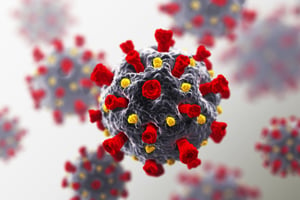A recent announcement from The Food and Drug Administration (FDA) on the Premarket Tobacco Authorization (PMTA) final ruling means that the vaping and cigar industries, most impacted by the PMTA...
US Food and Drug Administration (FDA) Centre for Tobacco Products (CTP) announce the latest update on the PMTA process
Nicotine

Jun 16, 2021 | Published by Dr. Nveed Chaudhary
Nicotine
Broughton Chief Regulatory Officer, Dr. Nveed Chaudhary, summarises the latest US Food and Drug Administration (FDA) Centre for Tobacco Products (CTP) update on the Premarket Tobacco Product Applications (PMTA) process and what this means for deemed applications.
On Friday June 11 2021, the US Food and Drug Administration (FDA) Centre for Tobacco Products (CTP) held a live webinar with Q&As and an update on the Premarket Tobacco Product application (PMTA) process, with the focus being primarily on deemed products with applications filed before September 9 2020.
Matthew Holman, Director of the Office of Science, started with a presentation discussing the deemed product PMTA review process, including the application intake, allocation of review processes and the progress of reviewing applications. He stated that the Office of Science’s goal for the webinar was to increase understanding and clarity of the PMTA review process.
So, what did we learn?
- The overwhelming focus of FDA CTP Office of Science is the protection of public health and in particular youth, from the harms associated with tobacco use.
- For companies that submitted timely applications, FDA will generally defer enforcement discretion until September 9 2021. The FDA’s goal is to transform the ENDS marketplace in the USA to ensure that only tobacco products that have undergone careful, science-based review and have continued oversight by FDA will remain in the market.
- FDA Office of Science has over 500 scientists and program staff across all the scientific disciplines pertinent to a PMTA application. All their staff have strong scientific backgrounds.
- FDA have developed reviewer guides and scientific memos to help harmonize the review of PMTAs across reviewers and applications. The FDA recommends the use of Tobacco Product Master Files (TPMFs) to support PMTAs as these help reduce application size and allow for a more efficient review process.
- The FDA have prioritized the review of products where the scientific review will have the greatest public health impact – based on their market share.
- For most products that fall outside of their prioritization, review selection has been randomized. However, they also stated that the prioritization might change if additional data comes to light indicating other products that are of public health interest.
- As widely reported previously, FDA have received and processed applications for 6.5 million products from over 500 companies. An acceptance from FDA means that the associated products fall under the CTP’s jurisdiction (i.e. they are a tobacco product) and confirms that the basic requirements of the application have been met.
- An application can be refused to be accepted (RTA) if i) there is a lack of product identification, ii) application files are in a format that cannot be processed, read, reviewed, or archived or iii) lacks an environmental assessment.
- As of April 1 2021, approximately 50,000 applications were issued an RTA and approximately 3.2M were accepted for filing. The remaining approximately 3.2M applications are still being processed for acceptance. After acceptance FDA will consider if all the information necessary to fulfil section 910(b)(1) of the FD&C act has been submitted. A deficiency in this area will result in a refuse to file (RTF). As of April 1 2021, approximately 40,000 applications have been accepted for filing, and around 2,000 have been granted an RTF.
- Once an application has been accepted for filing, the next stage is Substantive Scientific Review, which results in either a deficiency letter, a request for environmental information, a market order granted, or a market order denied. FDA will notify the submitting company when their application enters substantive scientific review. Importantly, answering all the queries in a deficiency letter does not necessarily mean that your application will eventually be granted a market order. A deficiency letter is a snapshot at a point in time asking for further information which will allow FDA to carry on with a substantive scientific review.
Live Q&A
The information presented did not reveal anything different from what FDA has previously disseminated with regards to how the PMTA review process will be run. The information about prioritizing certain products that have the potential to influence public health and especially youth, is something that we were all aware of, but it had never been clearly articulated by FDA. Given FDA’s overwhelming focus to protect public health (especially youth), it is likely that closed, pod-based systems with high strength nicotine concentration combined with various flavors have found their way to the top of FDA’s priority list for review. The National Youth Tobacco Survey (NYTS) for 2020, published earlier this year, indicated that since the pod-based flavour ban in the US, many youths have transitioned onto flavored disposable systems, putting them next on FDA’s priority list. There have been very few reported youth-use issues with open systems, suggesting that these products may be at the bottom of FDA’s deemed product priority list.
Many of the questions posed in the Q&A sessions revolved around the timing of review and the enforcement discretion, which comes to an end on September 9 2021. FDA were clear that by this date, some authorization decisions will be made, and they stated that it is likely to be a mixture of both market authorizations and market denials. However, they openly admitted that there was no way all applications would be reviewed by then. So, what happens to your product if you have filed a PMTA by the September 9 2020 deadline and still have not received a marketing authorization or denial? The answer is, no one knows for sure, and FDA themselves appear not to know either. At least, they did not commit to a formal position in this webinar. It seems like there will be a pragmatic compromise reached with the courts to balance the timelines, the best interest in public health and sticking to the commitment FDA have around ensuring that all PMTA decisions are science-based. In essence, the likely scenario is that products that have been identified as a priority for FDA will have undergone some sort of substantive review by September 9 2021. Those other products, which are lower down on the priority list, might continue to enjoy further enforcement discretion, but ultimately, this will be a decision that the courts will have to decide upon. Request a copy of the full transcript here.
What does this mean for your deemed application?
A point that was repeated several times was that it is your responsibility to ensure that your application is complete when submitted to FDA for substantive review. This statement was followed up by an in-depth discussion, whereby it was stated that addendums of additional data could be submitted to FDA before the commencement of the substantive scientific review stage of the process. This is fantastic news for manufacturers who had submitted dossiers that were not as comprehensive as they would have liked; if your application has not yet entered substantive scientific review, you now have the opportunity to submit additional data at no penalty to your application. Furthermore, as well as being open to this, FDA also asked that if manufacturers were planning this, they should contact FDA and describe the anticipated plan of data generation and submission. If you leave this too late and your application does enter substantive scientific review, you run the risk of any addendums being detrimental to your application.
There were many questions around Deficiency letters for deemed applications. FDA have refined the process to try to accelerate the review process and have indicated that only one deficiency letter will be issued, with a 90-day frame to answer the queries within. This does mean that your deficiency letter needs to be right first time. Ideally, you already know where your deficiencies will be and have started working on accumulating that data. Three months is not a long time with study design, execution, interpretation, narration and submission all required.
At Broughton, we have specialist services to allow manufacturers to create and submit data addendums to PMTAs. If you have received a deficiency letter or want to be prepared in advance, we have a deficiency letter service that will help put you in the perfect position when that deficiency letter does arrive.
With regards to new product PMTA applications, FDA mentioned that although they have a dedicated team looking at non-deemed product applications, the focus is on trying to reach their legal obligations to review the deemed applications by September 9 2021. After September 2021 there would potentially be the bandwidth to dedicate more resources to new product applications. The same was stated for applications that have been made under the Modified Risk Tobacco Product pathway. They also stated that contrary to the case with deemed products, there is the likelihood that FDA will issue a number of deficiency letters for new products as there are no legally bound timelines for review of non-deemed product PMTAs.
Helping you to be prepared
Regardless of whether you are looking to provide supplementary data to a deemed product PMTA, want to be proactive and prepared or need to respond to a PMTA deficiency letter or indeed want to start the process from the beginning for a completely new product, Broughton can help you navigate towards PMTA success.
To discuss undertaking a gap analysis on your submission and preparing the required information, contact us to book a meeting with our regulatory Consulting team, so that we can help you advance a smoke-free future.
Can we help you?
Broughton have deep CRO capabilities and an experienced team of scientific and regulatory professionals to manage full service global regulatory projects. Our knowledge of global regulatory pathways offers significant insights that can be incorporated into your project plans. Our mission is to accelerate safer nicotine-delivery products to market; advancing a smoke-free future.
Book a meeting with us today to discuss your requirements.




